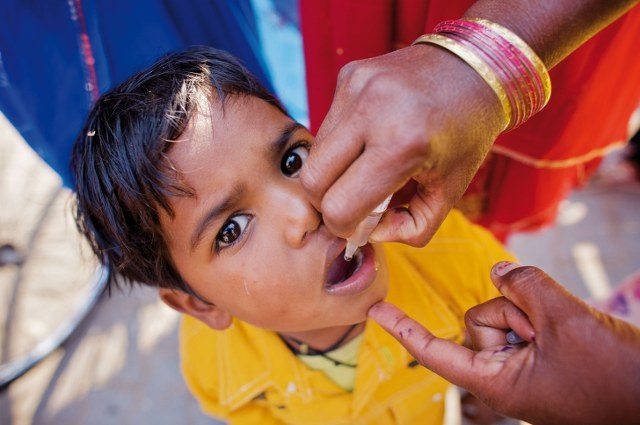Picking A Side In The Vaccine Debate
In 1998, Dr. Andrew Wakefield published a paper that correlated the development of regressive autism and colitis with the MMR (measles, mumps and rubella) vaccine. Sensationalization of these findings led to lowered vaccine rates, dropping the United Kingdom's herd immunity from 93% to 75% and as low as 50% in some areas of London. As of 2008, the UK has declared measles to be endemic. Plus, cases of pertussis (also known as "whooping cough") and measles have drastically increased because of parents’ fears about vaccinating their children.
It was later discovered that Wakefield was financed a total of £439,553 — part of a £3.4 million fund paid to scientists and medical practitioners under a lawsuit against vaccine companies — and that Wakefield applied for a measles vaccine patent, making him a direct competitor to the MMR vaccine. Following the controversy over conflicts of interest, TheLancet's retraction of the study, and the other authors' withdrawing their names from the study, Wakefield’s medical license was revoked.
Since then, many celebrities and politicians have taken up the cause, opposing vaccines for many reasons. The chief reason is still the idea that vaccines are a direct cause of autism. You can find plenty of content online that continues to propagate anti-vaccine sentiment.
I wanted to explore the opposition's side, and I stumbled across ageofautism.com. On their "about" page, they share their belief that autism is an environmentally stimulated, human-made, preventable illness, that many people have seen regressive autism and illness after vaccinations and that autism is the defining illness of today. Other arguments include the fact that vaccine companies have a stake in propagating vaccines for financial reasons, and the claim that anecdotal evidence suggests that Amish peoples have a proportionally low occurrence of autism and in general don’t vaccinate.
However, numerous studies and reviews conclusively dispel the idea that vaccines directly cause autism. Keep in mind that the general consensus among medical practitioners is that autism manifests itself clinically around the same time that children are advised to begin immunization. The notion that vaccine companies are only looking out for their own interests is far-fetched. It seems obvious to me in a profit-driven society that a company making a product is seeking profit. Conveniently, the naysayers never question Wakefield’s application for a vaccine patent and his acceptance of funding.
The prevalence of autism has remained the same over the last 20 years, and the greatest correlation to perceived increases in diagnosis comes from better awareness, resources and diagnostic tools. And as for the “Amish anomaly,” that has also been debunked. So where does this leave us? We managed to get quotes from some South Asian mothers regarding this controversy.
- “After a lot of research, and discussing the pros and cons of vaccines with multiple healthcare professionals, as a mom and natural healthcare doctor, we chose to vaccinate our children. I do not dismiss the research that links some childhood disorders to vaccines; however, the rare chance of a negative outcome from not vaccinating our children outweighed research.” —Jas Johal (healthcare)
- “No, not opposed to it at all. I believe every child should be vaccinated, as some diseases are deadly and we should not put other people’s children at risk for our own selfish reasons. My two cents!” —Sheba-Charles Funari (Loblaws)
- Parents have a responsibility to safe-guard their children from diseases by vaccinating them. We, as parents, make many choices on behalf of our children, and vaccinations should not be one of them, as the consequences of not vaccinating them are too far-reaching. As newborn children are too young for the vaccine and people under medical treatment are also excluded, the exposure risk is severe. Let's make decisions that make sense and protect our children." —Jaswinder Lamba (chiropractor)
Jenna McCarthy is the best-known and most vocal anti-vaccination advocate. She's particularly against the MMR vaccine, as she believes this vaccine causes autism in children — including her own son. It turns out that her son was misdiagnosed and most likely has Landau-Kleffner Syndrome.
It’s important to remember that celebrities' influence can often be misplaced, as they may lack expertise on a topic. When making medical decisions, it’s important to base your decisions on healthcare experts, facts, and risk assessment.
As I mentioned before, our understanding of autism is only expanding, and autism management is becoming easier and more effective. With the rising trend of people not vaccinating their children, the prevalence of diseases thought to have been eradicated is also rising. We're even seeing deaths from these diseases.
As one of our quotes above states, the tiny risk of developing unwanted conditions — which hasn’t been definitively proven — is well worth the risk of contracting a serious infectious disease, which is a proven, documented occurrence.
Feature photo courtesy of the Global Polio Eradication Initiative via fda.gov
Vikram Bettadapura
Author
When he’s not blogging, Vikram Bettadapura works at a busy vet clinic. Born in Bangalore, he grew up in Abu Dhabi and later moved to Ontario, where he earned a BSc from the University of Guelph. Currently based in Toronto, he's an avid reader, passionate about culture, social issues, and ...














































































































